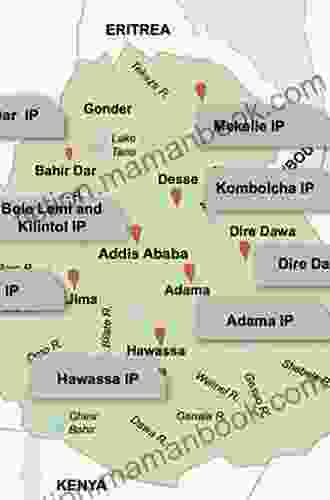Made in Africa Industrial Policy in Ethiopia: A Comprehensive Guide for Investors and Policymakers

4.5 out of 5
| Language | : | English |
| File size | : | 6329 KB |
| Text-to-Speech | : | Enabled |
| Screen Reader | : | Supported |
| Enhanced typesetting | : | Enabled |
| Word Wise | : | Enabled |
| Print length | : | 372 pages |
| Lending | : | Enabled |
In its quest for economic development and industrial transformation, Ethiopia has adopted the "Made in Africa Industrial Policy." This forward-thinking policy aims to harness the nation's vast resources and skilled workforce to establish a robust manufacturing sector. The policy presents a blueprint for Ethiopia's industrialization journey, outlining strategic objectives, implementation strategies, and incentives to attract investors. This comprehensive guide delves into the key aspects of the Made in Africa Industrial Policy, providing valuable insights for investors and policymakers.

Objectives of the Made in Africa Industrial Policy
- Accelerated Industrial Growth: The policy aims to stimulate rapid industrial expansion, diversifying the economy and reducing dependence on primary exports.
- Increased Employment Creation: By fostering industrial development, the policy seeks to generate substantial employment opportunities for Ethiopia's growing workforce.
- Improved Export Competitiveness: The policy aims to enhance the competitiveness of Ethiopian manufactured goods in regional and global markets.
- Technology Transfer and Innovation: The policy encourages technology transfer and promotes innovation to enhance industrial productivity and product quality.
- Regional Economic Integration: The policy aligns with the broader African Continental Free Trade Area (AfCFTA),fostering regional economic cooperation and trade.
Key Implementation Strategies
To achieve its objectives, the Made in Africa Industrial Policy outlines a comprehensive set of implementation strategies:
- Industrial Park Development: Ethiopia has established industrial parks equipped with infrastructure, amenities, and incentives to attract investors.
- Sectoral Prioritization: The policy identifies priority sectors for industrial development, including textiles, leather, pharmaceuticals, agro-processing, and chemicals.
- Investment Incentives: The government offers attractive incentives, such as tax breaks, land concessions, and export subsidies, to encourage domestic and foreign investment.
- Human Capital Development: The policy emphasizes investment in education and training to develop a skilled workforce for the manufacturing sector.
- Infrastructure Development: The government prioritizes infrastructure expansion, including roads, railways, and energy, to support industrial growth.
Opportunities for Investors
The Made in Africa Industrial Policy presents numerous opportunities for investors:
- Access to a Growing Market: Ethiopia's large and expanding population provides a vast market for manufactured goods.
- Abundant Natural Resources: Ethiopia possesses rich natural resources, including minerals, agricultural products, and renewable energy, which can serve as raw materials for manufacturing.
- Favorable Investment Climate: The government offers favorable investment conditions, including legal protections, streamlined regulations, and dispute resolution mechanisms.
- Regional Trade Hub: Ethiopia's strategic location and AfCFTA membership grant access to a vast regional market.
- Low Labor Costs: Ethiopia's labor costs are competitive compared to other manufacturing destinations.
Challenges and Recommendations
While the Made in Africa Industrial Policy holds immense potential, certain challenges need to be addressed:
- Infrastructure Gaps: Ethiopia faces challenges in infrastructure development, particularly in rural areas, which can hinder industrial expansion.
- Skills Shortage: Despite efforts to develop human capital, the manufacturing sector faces a shortage of skilled workers in specific fields.
- Competition: Ethiopia faces competition from other countries in the region and globally for foreign investment and market share.
- Policy Implementation: Effective implementation of the policy is crucial to achieve its objectives, requiring coordination and collaboration among government agencies.
- Financing: Access to finance for investors, especially small and medium-sized enterprises, remains a challenge.
To overcome these challenges, the following recommendations are proposed:
- Accelerated Infrastructure Development: The government should prioritize infrastructure investment, particularly in transportation, energy, and water.
- Enhanced Vocational Education: Investment in vocational education and training programs is essential to address the skills gap.
- Foreign Direct Investment Promotion: Ethiopia should continue to attract foreign direct investment through targeted marketing and investment facilitation.
- Policy Consistency and Transparency: Clear and consistent policies, as well as transparent regulatory processes, are crucial for investor confidence.
- Access to Finance: The government and financial institutions should explore innovative financing mechanisms to support industrial development.
The Made in Africa Industrial Policy in Ethiopia is a transformative initiative that aims to propel the nation's industrialization journey. By harnessing its natural resources, skilled workforce, and strategic location, Ethiopia is poised to become a manufacturing hub in the region. However, successful implementation requires addressing challenges and implementing effective strategies. For investors, the policy offers immense opportunities, backed by favorable investment conditions and access to a growing market. By embracing innovation, fostering partnerships, and addressing challenges, Ethiopia can realize its industrial aspirations and contribute to the broader economic development of Africa.
References:
- Made in Africa Industrial Policy, Ethiopian Ministry of Industry and Enterprise
- Investment Opportunities in Ethiopia, Embassy of Ethiopia in the USA
- Made in Africa Initiative, UNCTAD
- Ethiopia Industrial Performance and Policy Options, The World Bank
- Ethiopia's Made in Africa Industrial Policy: What it is and Why it Matters, Brookings Institution
4.5 out of 5
| Language | : | English |
| File size | : | 6329 KB |
| Text-to-Speech | : | Enabled |
| Screen Reader | : | Supported |
| Enhanced typesetting | : | Enabled |
| Word Wise | : | Enabled |
| Print length | : | 372 pages |
| Lending | : | Enabled |
Do you want to contribute by writing guest posts on this blog?
Please contact us and send us a resume of previous articles that you have written.
 Top Book
Top Book Novel
Novel Fiction
Fiction Nonfiction
Nonfiction Literature
Literature Paperback
Paperback Hardcover
Hardcover E-book
E-book Audiobook
Audiobook Bestseller
Bestseller Classic
Classic Mystery
Mystery Thriller
Thriller Romance
Romance Fantasy
Fantasy Science Fiction
Science Fiction Biography
Biography Memoir
Memoir Autobiography
Autobiography Poetry
Poetry Drama
Drama Historical Fiction
Historical Fiction Self-help
Self-help Young Adult
Young Adult Childrens Books
Childrens Books Graphic Novel
Graphic Novel Anthology
Anthology Series
Series Encyclopedia
Encyclopedia Reference
Reference Guidebook
Guidebook Textbook
Textbook Workbook
Workbook Journal
Journal Diary
Diary Manuscript
Manuscript Folio
Folio Pulp Fiction
Pulp Fiction Short Stories
Short Stories Fairy Tales
Fairy Tales Fables
Fables Mythology
Mythology Philosophy
Philosophy Religion
Religion Spirituality
Spirituality Essays
Essays Critique
Critique Commentary
Commentary Glossary
Glossary Bibliography
Bibliography Index
Index Table of Contents
Table of Contents Preface
Preface Introduction
Introduction Foreword
Foreword Afterword
Afterword Appendices
Appendices Annotations
Annotations Footnotes
Footnotes Epilogue
Epilogue Prologue
Prologue Daniel Humm
Daniel Humm Sophia A Yin
Sophia A Yin Ken Little
Ken Little Camilla Pang
Camilla Pang Michael Hathaway
Michael Hathaway Simone Cave
Simone Cave David Eldridge
David Eldridge Kimberly Carrillo
Kimberly Carrillo Wendy Lawson
Wendy Lawson James Goldberg
James Goldberg Richard Dawkins
Richard Dawkins Jeanne Felfe
Jeanne Felfe Carmen Desousa
Carmen Desousa Mary Lou Brandvik
Mary Lou Brandvik Kimberly Denney
Kimberly Denney Kyle Higgins
Kyle Higgins Safia Elhillo
Safia Elhillo Helen Baumann
Helen Baumann Walter Crane
Walter Crane Jeff Sutherland
Jeff Sutherland
Light bulbAdvertise smarter! Our strategic ad space ensures maximum exposure. Reserve your spot today!

 Samuel Taylor ColeridgeOf Old English Ballads: With an Accompaniment of Decorative Drawings
Samuel Taylor ColeridgeOf Old English Ballads: With an Accompaniment of Decorative Drawings
 Branden SimmonsThe True Tale of the Republic: Uncovering the Rich History of the United...
Branden SimmonsThe True Tale of the Republic: Uncovering the Rich History of the United...
 Curtis StewartHaiku for Your Soul: Issue 13 - A Journey into the Heart of Japanese Poetry
Curtis StewartHaiku for Your Soul: Issue 13 - A Journey into the Heart of Japanese Poetry Milan KunderaFollow ·12k
Milan KunderaFollow ·12k Easton PowellFollow ·4.7k
Easton PowellFollow ·4.7k Dallas TurnerFollow ·16.9k
Dallas TurnerFollow ·16.9k Timothy WardFollow ·17.5k
Timothy WardFollow ·17.5k Stephen KingFollow ·12.4k
Stephen KingFollow ·12.4k Samuel WardFollow ·13.1k
Samuel WardFollow ·13.1k Avery SimmonsFollow ·6.7k
Avery SimmonsFollow ·6.7k Jesse BellFollow ·5.1k
Jesse BellFollow ·5.1k

 Abe Mitchell
Abe MitchellWhy Unleashing the Instinct to Play Will Make Our...
Play is an essential part of childhood. It is...

 Rubén Darío
Rubén DaríoTheory in Health Promotion Research and Practice
Theory is essential...

 Howard Blair
Howard BlairFailing Students or Failing Schools: Uncovering the Root...
In the United States, the issue of failing...

 Ira Cox
Ira CoxPoetry From the Heart Chope: A Symphony of Soul and Verse
Embark on a literary...

 Easton Powell
Easton PowellThe Witch Hunt: Wicked Witches of Shadow Woods
In the cursed woods of...
4.5 out of 5
| Language | : | English |
| File size | : | 6329 KB |
| Text-to-Speech | : | Enabled |
| Screen Reader | : | Supported |
| Enhanced typesetting | : | Enabled |
| Word Wise | : | Enabled |
| Print length | : | 372 pages |
| Lending | : | Enabled |








